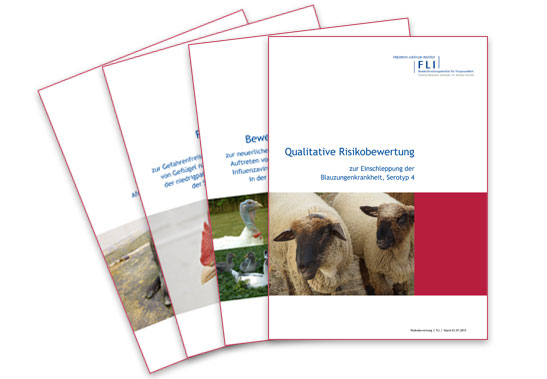The bluetongue virus is transmitted by small, blood-sucking midges (midges), which are usually only active in the summer months. As soon as this is the case, infections of cattle and sheep with bluetongue serotype 3 (BTV-3) are to be expected, particularly in North Rhine-Westphalia and Lower Saxony. The Friedrich-Loeffler-Institut (FLI) estimates the risk of seasonal transmission of bluetongue from May onwards to be high. In the current risk assessment, the FLI also considers the risk of the spread of BTV-3 through the movement of ruminants from affected areas to free areas. There is no effective way to prevent the spread of BTV-3 through wind drift and the movement of midges. Vaccination could protect susceptible ruminants, but no authorised vaccine against BTV-3 is yet available.
From September 2023, BTV-3 spread extensively in the Netherlands in a very short space of time. Sheep in particular became seriously ill, with up to a quarter of the infected animals dying. At the beginning of October 2023, Belgium and then Germany reported the first cases, followed by the United Kingdom in November. By mid-February, the National Reference Laboratory for Bluetongue at the FLI had identified 39 outbreaks in Lower Saxony and North Rhine-Westphalia.
Overall, the options for action for BTV-3 are limited. The experience of 2006-2010 with BTV-8 showed that the best protection against clinical symptoms and to enable trade is vaccination against BTV. However, as there are currently no authorised vaccines to protect animals against BTV-3, the best that can be done is to try to prevent the spread of the disease by restricting trade.
According to the FLI, only limited options are conceivable to enable trade nevertheless. Delegated Regulation (EU) No 2020/689 outlines options for trade in animals from non-free areas. According to this, it would be possible to designate a seasonally BTV-free area during the mosquito-free period. Vector monitoring is necessary for this. Only a few vectors are active in the period from December to April, so the probability of transmission is low. According to (EU) 2020/689, animals can be moved more easily during this period. Due to the fact that no vaccine is yet available, no vector-free period has been designated and there are no vector-free farms, the only option for movement to free areas is treatment with repellents and testing of the animals using PCR testing. The time between a negative test and transport should be kept as short as possible in order to rule out infection after testing.
Vaccination with inactivated vaccines has proven to be the most effective, safest and only practicable way of effectively protecting animals against bluetongue infection. It is also possible to trade in vaccinated animals without spreading bluetongue. Following the outbreak of bluetongue in the Netherlands, several vaccine manufacturers were contacted. However, it is not yet possible to estimate when and in what quantity vaccines will be available. All possibilities should be examined in order to prevent animal suffering, minimise economic consequences and facilitate trade.
A manufacturer from Lower Saxony was granted a manufacturing licence for the production of an autogenous BTV-3 vaccine in March of this year. In its current statement, the Standing Committee on Vaccination in Veterinary Medicine (StIKo Vet; German language only) provides advice on the use of autogenous vaccines in the current BTV-3 outbreak.
Due to the great danger that exists, the StIKo Vet advocates the voluntary use of an autogenous BTV-3 vaccine in the interests of animal health and animal welfare and to avoid unacceptable suffering during the period in which no authorised vaccine is yet available.


